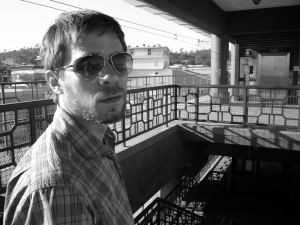Author Ben Ehrenreich Is No Stranger to Creating New Worlds
GALO: You have explored various styles of writing. Can we ever expect a book of poems from Ben Ehrenreich?
BE: Not really. When I was younger I wrote poems. I maybe write one thing that could be counted as poetry every three or four years and usually it’s just because something I’m writing strays too far outside the lines of conventional prose to be called prose. I do read poetry but I don’t know enough about the world of poetry to even feel comfortable calling something that I write, a poem. I’m really happy if I show something to a poet friend and they like it. They say: “that’s a good poem,” but it doesn’t happen that often.
GALO: Some writer’s listen to music while they create or use another external input. Do you do anything like that?
BE: Not when I’m writing, no. I need a kind of sensory deprivation. I think I brought speakers to hook up to my computer in my office a few years ago, and perhaps used them once, listening to music while cleaning the office or something, but while I’m writing, no, not at all. Actually, even if there is no ambient noise around, I usually use earplugs just to seal off my skull.
GALO: Do you prefer longer or shorter writing sessions — any particular method?
BE: No, it’s sort of catch as catch can often because I’m usually doing four or five things at once. But in ideal circumstances, I write in the mornings. And in [perfectly] ideal circumstances, I write all morning. I usually find that, certainly by two or three in the afternoon, the parts of my brain that are good at putting words together, are no longer good for anything. But usually from seven a.m. to early afternoon, I’m pretty sharp.
GALO: Do you like coffee?
BE: I like coffee very much.
GALO: Since you’ve been involved with City Lights Publishers, I was wondering if you ever had the opportunity to meet its co-founder, Lawrence Ferlinghetti?
BE: No, I haven’t. I think he’s over 90 now, (93). He’s not in the offices very much at all anymore. But it was cool — I was there to give a reading in November and the publicity director wanted to interview me to do a podcast that they put up on their website, so we had to find a quiet space in the office. She ushered me into this one smaller office, off the large office, and had me sit down in this creaky old wood office chair and said, “That’s Lawrence’s chair.” And it took a little while before the synapses connected, then I said, “Lawrence’s chair!” [Laughs] I liked that. I mean City Lights has been really great. Certainly one of the exciting things about being a part of that is Ferlinghetti’s chair, and their list of authors is so deep and terrific: from [Allen] Ginsberg to Ishmael Reed to Juan Goytisolo; a lot of writers who have been really important to me.
GALO: How did your relationship with City Lights begin?
BE: I knew the publicist there because I reviewed a few of their books and interviewed a few of their writers in my other life as a journalist, sometimes book critic. I wrote to Stacy Lewis, the publicist there, to send me a copy of one book or another and she wrote to me and asked if I had anything to send them, and as luck had it, I did. And it worked out well.
GALO: Finally let’s go back to Ether.When the book talks about the stars above the clouds and the stars above the stars in all that vastness; is this where a hint of optimism might dwell?
BE: On one level, what I started doing with this book was attacking a certain concept of God. I mean the story I told you about genesis from the sniper, the idea [of] that mock and assault, a notion of God that I found really kind of repugnant, is basically Old Testament, patriarchal man in the sky. But I didn’t want to write a novelistic version of Christopher Hitchens’ book (God Is Not Great: How Religion Poisons Everything), and I wasn’t satisfied by just mocking and taking down all of that, and wanted to offer up and this isn’t probably the right way to put it, or maybe just to describe a sense of a source, shall we say, of holiness that has nothing to do with a transcendent figure. And I’m not sure if that’s a source of optimism or not. It’s not necessarily that there’s a force of benevolence or goodness out there in the universe but there is for human beings I think an excruciating sense of beauty. It’s hard to make sense of. And that sense of beauty may just be one of the peculiarities of being a human and may not suggest anything about the world beyond us.


